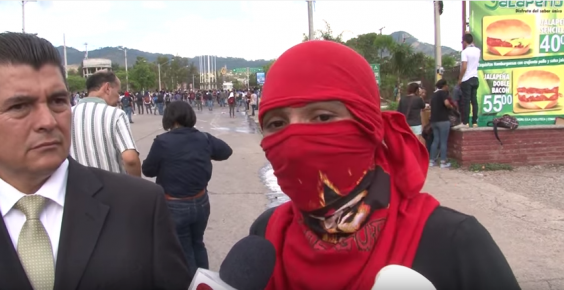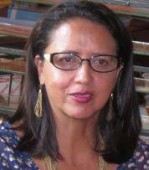The Office of the High Commissioner for Human Rights in Honduras Must View the Country with Three Eyes
by Dina Meza translated by Katherine Wingfield-Dobbs / January 13, 2017 / No comments

Student protesters in Honduras were among those who had human rights abuses enacted against them. Image via YouTube.
The inauguration of the UN High Commissioner Office in Honduras demonstrates the difference between rhetoric and reality.
The Honduran Office of the UN High Commissioner for Human Rights was formally inaugurated on November 23, 2016 in the presence of Kate Gilmore, UN Deputy High Commissioner for Human Rights, whose headquarters are in Geneva, Switzerland.
The Honduran Government requested that this agency be opened through President Juan Orlando Hernández, as part of its international strategy of appearing to respect human rights. Before the 2015 Universal Periodic Review (2015 UPR), the government announced the agency’s opening with much fanfare. The President made a political move to try to counteract criticism in the face of the serious human rights situation in the country.
The mandate by the Office of the High Commissioner is that there must be full protection and a mandate for investigation and security guarantees. Ban Ki-Moon, the former UN Secretary General, reaffirmed this guarantee in his January visit to Honduras, one of the most dangerous countries to defend rights and be a journalist.

- Honduras has one of the world’s highest murder rates. It is also one of the most dangerous countries to practice journalism, ranking 129th out of 180 in the 2014 World Press Freedom Index. Journalists are regularly threatened, attacked, and killed for their work. The Honduran government fails to punish those who use violence against reporters, essentially granting them impunity. This space will be dedicated to examining the lack of protection for Honduran journalists exercising their profession. Topics will include the use of state-sponsored advertising as a mechanism to reward or punish publications, and censorship and self-censorship as hindrances to democratic progress.

- Born in Cofradía, Honduras, Dina Meza has been recognized by PEN International, Amnesty International, Index on Censorship and Reporters without Borders for her work as a journalist and human rights advocate. Currently, Dina is the driving force behind the creation of Honduras PEN Centre. In 2013, she wrote “Reign of Terror,” an in-depth report on threats to Honduran journalists for Index on Censorship’s magazine. In 2014, she was named one of Reporters Without Borders’ “100 Heroes and Heroines of Information.”
Hernández scored points with the opening of this agency, trying to clean the dirty face of his government in the field of human rights. He said he gives his full support so that this international organization can carry out its work.
The president’s rhetoric must be contrasted with a three-dimensional view by the Office of the High Commissioner for Human Rights (OHCHR) in Honduras.
This means that the siren calls must remain in the corner, while the Office does its job of protecting human rights in the country without being swayed by attractive reports and the friendly smiles of officials.
The work must contrast reality with theory. While the government handles the statistics of progress, there are serious human rights violations and the perpetrators go unpunished. The emblematic case of Berta Cáceres, where no progress is being made to punish the masterminds of her assassination, serves as just one example.
The verification of the human rights situation must include conversations with the victims, document real cases, and promote tough actions against impunity.
The Office has played some important roles in its short time in Honduras, as is the case of the conflict at the National Autonomous University of Honduras (Universidad Nacional Autónoma de Honduras, UNAH), where some officials have been observing the process. The Office’s involvement has contributed to establishing dialogue between authorities and students. But we have not seen it in the case of the National University of Agriculture (Universidad Nacional de Agricultura, UNA), where there is already talk of paramilitary action against students who continue to protest against violations of their student rights.
Although Hernández has praised democracy, this must not cloud the three-dimensional view: the reality of human rights, the testimonies of victims, and the government discourse that must be read between the lines.
I happened to be at the official inauguration of the Office on November 23. Ms. Gilmore indicated that the established team wanted to make progress in human rights in Honduras, saying, “you know that we are very interested in working with government institutions to raise the dignity of those you govern.”
Jorge Ramón Hernández, Secretary General Coordinator of the Government, stated that “we have a duty not only to listen but to be tolerant of the people.” His statement contrasts with the capture of Professor Ruy Díaz in San Pedro Sula in the North of the country. Díaz was captured for merely hanging a sheet with the slogan “Out JOH,” referring to President Juan Orlando Hernández, who is seeking presidential reelection.
We understand that the responsibility placed on the shoulders of the Office of the High Commissioner in Honduras is not easy in a nation where there are violations of human rights everywhere.
However, it is extremely important that the role of the Office is in line with the mandate to promote and protect the enjoyment and full realization of all the rights referred to in the UN Charter and in the laws and international treaties on human rights. The General Assembly of the United Nations assigned the Charter to the Office of the High Commissioner for Human Rights, in accordance with Resolution Number 48/41.
I have seen human rights officers very committed to doing their job of guaranteeing the fundamental rights of the Honduran people. I have even brought victims of human rights violations to this institution, and it seems to me that they are eager to do their job well.
But, in addition, the Office must take care that in its diplomatic discourse it does not stifle the right to truth, which constitutes a human right. Specifically, this Office must tell it like it is, because the crucial thing is to reform behavior, actions, laws and public policies that destroy human rights. Honduras is a bad example in that respect.




